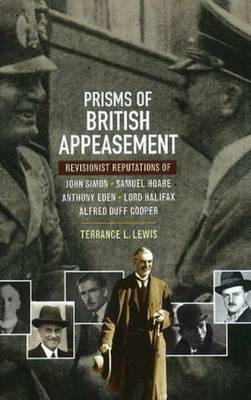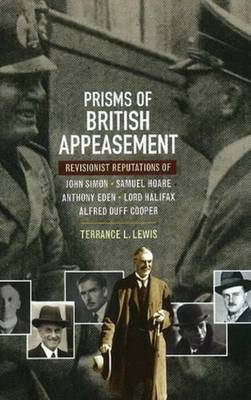
- Afhalen na 1 uur in een winkel met voorraad
- Gratis thuislevering in België vanaf € 30
- Ruim aanbod met 7 miljoen producten
- Afhalen na 1 uur in een winkel met voorraad
- Gratis thuislevering in België vanaf € 30
- Ruim aanbod met 7 miljoen producten
Zoeken
Prisms of British Appeasement
Revisionist Reputations of John Simon, Samuel Hoare, Anthony Eden, Lord Halifax and Alfred Duff Cooper
Terrance L Lewis
Hardcover | Engels
€ 132,95
+ 265 punten
Omschrijving
Of these five major political figures from the National Governments of the 1930s, three were condemned in a famous 1940 pamphlet as major 'Guilty Men' -- appeasers responsible for Britain's failure to contain Hitler and Mussolini. Anthony Eden and Duff Cooper were excused since they had resigned from office in 1938. All of them wrote memoirs to give their version of the events of the 1930s, and each has attracted at least one biographer. Their actions and evolving reputations centred around their different international perspectives and governmental experience with respect to the collective policies advocating appeasement. Each man's career acts as a prism, reflecting different national and international perspectives (or viewpoints) of the time. As such, all five therefore deserve to be judged on their own separate relationships with Neville Chamberlain and his and their attitudes to appeasement, foreign policy, and rearmament. An important theme of the book is that the totality of their experiences, political positions and actions gives the historian a much wider perception of the policy options available to Britain in contrast to concentrating on just the issues and policies of one participant, or of Chamberlain himself. The comparison of their careers, opinions and actions provides a very different slant on the appeasement issue. The work utilises both recent and classic monographs on the period prior to the outbreak of the Second World War, the memoirs and biographies of the five subjects, and numerous other biographies, memoirs, and sources that tackle one of the most perplexing and divisive periods in modern British history.
Specificaties
Betrokkenen
- Auteur(s):
- Uitgeverij:
Inhoud
- Aantal bladzijden:
- 233
- Taal:
- Engels
Eigenschappen
- Productcode (EAN):
- 9781845194222
- Verschijningsdatum:
- 12/10/2010
- Uitvoering:
- Hardcover
- Formaat:
- Genaaid
- Afmetingen:
- 160 mm x 231 mm
- Gewicht:
- 476 g

Alleen bij Standaard Boekhandel
+ 265 punten op je klantenkaart van Standaard Boekhandel
Beoordelingen
We publiceren alleen reviews die voldoen aan de voorwaarden voor reviews. Bekijk onze voorwaarden voor reviews.











